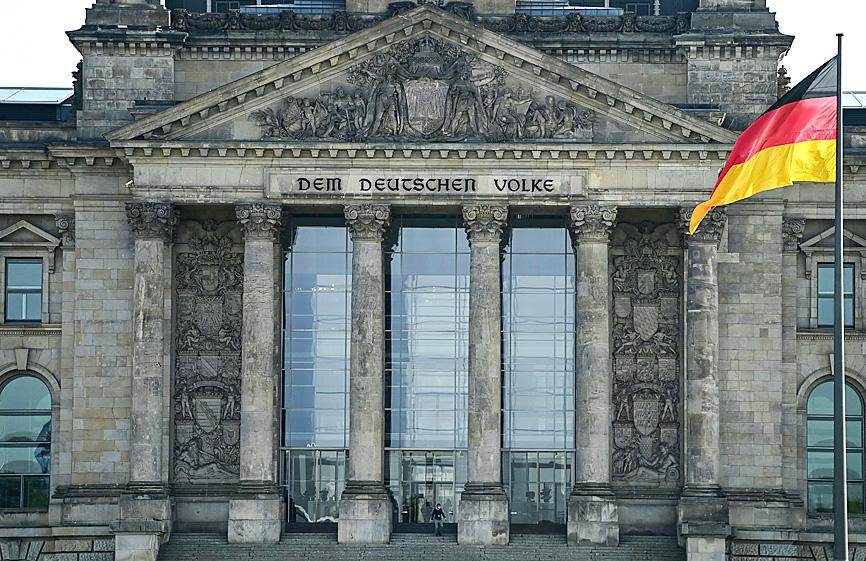Use of the phrase “democratic Taiwan” by Germany’s new coalition government in official document shows that Taiwan-China issues are not about “independence” against “unification,” but about democracy against authoritarianism, Representative to Germany Shieh Jhy-wey (謝志偉) said yesterday.
Germany’s Social Democratic Party, Free Democratic Party and the Greens — known as the “traffic light coalition” for their colors — on Wednesday inked a coalition agreement following elections on Sept. 26.
The agreement, a blueprint for their governance for the next four years, mentions “Taiwan,” which is unprecedented, showing that the new German government is paying close attention to cross-strait peace and supports Taiwan’s participation in international affairs, Shieh wrote on Facebook in Mandarin.

Photo: AFP
In particular, the word “Taiwan” is modified by the adjective “demokratisch,” German for “democratic,” he said.
“As Taiwan’s envoy to Germany, I would like to express respect and gratitude to the new German government,” Shieh wrote.
The wording highlights that Taiwan-China issues are not about unification or independence, which is how Beijing and its proxies in Taiwan frame the debate to conceal the real problem, he said.
When the debate is reduced to a choice between unification and independence, that implies it is an internal affair, excluding outside intervention, which is exactly what China wants, Shieh said.
When the framing shows that there is a struggle between democracy and autocracy, it forces observers to make a values-based assessment, he said, adding that in this context, Taiwan’s like-minded partners would strive to defend democracy and back the nation.
Shieh also thanked members of the Germany-Taiwan Parliamentary Friendship Group and the German-Taiwan Association.
The association, which earlier this year was renamed from the German-Chinese Association-Friends of Taiwan, is more than 60 years old, he said.
It is lovely to work with these people to fight for Taiwan, Shieh said.
In Taipei, the Ministry of Foreign Affairs also thanked the German government for its support.
The new coalition government has outlined its plans to promote rules-based trade, security in the Asia-Pacific region, democracy, human rights and the rule of law, ministry spokeswoman Joanne Ou (歐江安) said in a statement.
The ministry looks forward to working with the German government to deepen mutually beneficial relations and to maintain the “status quo” across the Taiwan Strait, Ou said.
The bilateral relationship has steadily deepened, Ou said, adding that over the past four years, the two sides have signed 12 pacts.
Among them is an aviation service agreement that was signed on July 15 and took effect immediately, paving the way for direct flights between Taipei and Munich, she said.

Taiwan is gearing up to celebrate the New Year at events across the country, headlined by the annual countdown and Taipei 101 fireworks display at midnight. Many of the events are to be livesteamed online. See below for lineups and links: Taipei Taipei’s New Year’s Party 2026 is to begin at 7pm and run until 1am, with the theme “Sailing to the Future.” South Korean girl group KARA is headlining the concert at Taipei City Hall Plaza, with additional performances by Amber An (安心亞), Nick Chou (周湯豪), hip-hop trio Nine One One (玖壹壹), Bii (畢書盡), girl group Genblue (幻藍小熊) and more. The festivities are to

Auckland rang in 2026 with a downtown fireworks display launched from New Zealand’s tallest structure, Sky Tower, making it the first major city to greet the new year at a celebration dampened by rain, while crowds in Taipei braved the elements to watch Taipei 101’s display. South Pacific countries are the first to bid farewell to 2025. Clocks struck midnight in Auckland, with a population of 1.7 million, 18 hours before the famous ball was to drop in New York’s Times Square. The five-minute display involved 3,500 fireworks launched from the 240m Sky Tower. Smaller community events were canceled across New Zealand’s

‘IRRESPONSIBLE’: Beijing’s constant disruption of the ‘status quo’ in the Taiwan Strait has damaged peace, stability and security in the Indo-Pacific region, MOFA said The Presidential Office yesterday condemned China’s launch of another military drill around Taiwan, saying such actions are a “unilateral provocation” that destabilizes regional peace and stability. China should immediately stop the irresponsible and provocative actions, Presidential Office spokeswoman Karen Kuo (郭雅慧) said, after the Chinese People’s Liberation Army (PLA) yesterday announced the start of a new round of joint exercises around Taiwan by the army, navy and air force, which it said were approaching “from different directions.” Code-named “Justice Mission 2025,” the exercises would be conducted in the Taiwan Strait and in areas north, southwest, southeast and east of Taiwan

UNDER WAY: The contract for advanced sensor systems would be fulfilled in Florida, and is expected to be completed by June 2031, the Pentagon said Lockheed Martin has been given a contract involving foreign military sales to Taiwan to meet what Washington calls “an urgent operational need” of Taiwan’s air force, the Pentagon said on Wednesday. The contract has a ceiling value of US$328.5 million, with US$157.3 million in foreign military sales funds obligated at the time of award, the Pentagon said in a statement. “This contract provides for the procurement and delivery of 55 Infrared Search and Track Legion Enhanced Sensor Pods, processors, pod containers and processor containers required to meet the urgent operational need of the Taiwan air force,” it said. The contract’s work would be